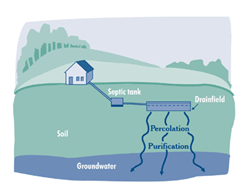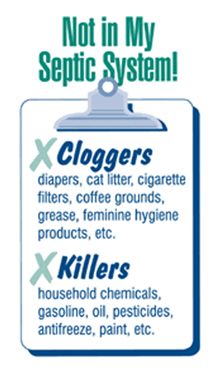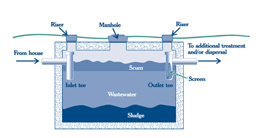Septic Systems
source: EPA
Information for Homeowners
If your septic tank failed, or you know someone whose did, you are not alone. As a homeowner, you are responsible for maintaining your septic system. Proper septic system maintenance will help keep your system from failing and will help maintain your investment in your home. Failing septic systems can contaminate the ground water that you or your neighbors drink and can pollute nearby rivers, lakes and coastal waters.
Ten simple steps you can take to keep your septic system working properly.
- Locate your septic tank and drainfield. Keep a drawing of these locations in your records.
- Have your septic system inspected at least every three years.
- Pump your septic tank as needed (generally every three to five years).
- Don't dispose of household hazardous wastes in sinks or toilets.
- Keep other household items, such as dental floss, feminine hygiene products, condoms, diapers, and cat litter out of your system.
- Use water efficiently.
- Plant only grass over and near your septic system. Roots from nearby trees or shrubs might clog and damage the system. Also, do not apply manure or fertilizers over the drainfield.
- Keep vehicles and livestock off your septic system. The weight can damage the pipes and tank, and your system may not drain properly under compacted soil.
- Keep gutters and basement sump pumps from draining into or near your septic system.
- Check with your local health department before using additives. Commercial septic tank additives do not eliminate the need for periodic pumping and can be harmful to your system.
How does it work?
 the soil. Microbes in the soil digest or remove most contaminants from wastewater before it eventually reaches groundwater. The septic tank is a buried, watertight container typically made of concrete, fiberglass, or polyethylene. It holds the wastewater long enough to allow solids to settle out (forming sludge) and oil and grease to float to the surface (as scum). It also allows partial decomposition of the solid materials. Compartments and a T-shaped outlet in the septic tank prevent the sludge and scum from leaving the tank and traveling into the drainfield area. Screens are also recommended to keep solids from entering the drainfield. The wastewater exits the septic tank and is discharged into the drainfield for further treatment by the soil. Microorganisms in the soil provide final treatment by removing harmful bacteria, viruses, and nutrients.
the soil. Microbes in the soil digest or remove most contaminants from wastewater before it eventually reaches groundwater. The septic tank is a buried, watertight container typically made of concrete, fiberglass, or polyethylene. It holds the wastewater long enough to allow solids to settle out (forming sludge) and oil and grease to float to the surface (as scum). It also allows partial decomposition of the solid materials. Compartments and a T-shaped outlet in the septic tank prevent the sludge and scum from leaving the tank and traveling into the drainfield area. Screens are also recommended to keep solids from entering the drainfield. The wastewater exits the septic tank and is discharged into the drainfield for further treatment by the soil. Microorganisms in the soil provide final treatment by removing harmful bacteria, viruses, and nutrients.Your septic system is your responsibility!
 contaminate surface waters and groundwater.
contaminate surface waters and groundwater.- Plant only grass over and near your septic system. Roots from nearby trees or shrubs might clog and damage the drainfield.
- Don't drive or park vehicles on any part of your septic system. Doing so can compact the soil in your drainfield or damage the pipes, tank, or other septic system components.
- Keep roof drains, basement sump pump drains, and other rainwater or surface water drainage systems away from the drainfield. Flooding the drainfield with excessive water slows down or stops treatment processes and can cause plumbing fixtures to back up.
Why should I maintain my septic system?
A key reason to maintain your septic system is to save money! Failing septic systems are expensive to repair or replace, and poor maintenance is often the culprit. Having your septic system inspected (at least every 3 years) is a bargain when you consider the cost of replacing the entire system. Your system will need pumping every 3 to 5 years, depending on how many people live in the house and the size of the system. An unusable septic system or one in disrepair will lower your property's value and could pose a legal liability. Other good reasons for safe treatment of sewage include preventing the spread of infection an disease and protecting water resources. Typical pollutants in household wastewater are nitrogen phosphorus, and disease-causing bacteria and viruses. Nitrogen and phosphorus are aquatic plant nutrients that can cause unsightly algae blooms. Excessive nitrate-nitrogen in drinking water can cause pregnancy complications, as well as methemoglobinemia (also known as blue baby syndrome) in infancy. Pathogens can cause communicable diseases through direct or indirect body contact or ingestion of contaminated water or shellfish. If a septic system is working properly, it will effectively remove most of these pollutants.

